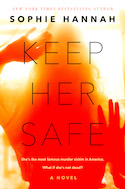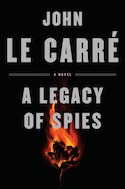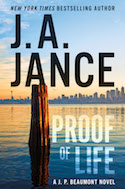Criminal Fiction: killer podcasts
Every month, Daneet Steffens uncovers the latest goings on in mystery, suspense, and crime fiction. See previous columns on the Criminal Fiction archive page

Photo credit: Paul Reich. L to R: Veste, Billingham, Dolan, Rankin, Neville, Cavanagh.
Kudos to Denise Mina for winning Bloody Scotland’s McIlvanney Prize for the best Scottish Crime book of the year. Her terrific The Long Drop is a beautifully-paced, novelistic slice of 1950s Glasgow, as well as an astute re-imagining of a real-life crime that riveted the city (and, to some extent, still does). Cheekier kudos are due to the Two Crime Writers and A Microphone podcasters Steve Cavanagh and Luca Veste, and their festival live-event featuring a cast of crime-fiction gold: Ian Rankin, Eva Dolan, Mark Billingham, and Stuart Neville. Catch the hilarious, expletive-strewn outcome here, with episode 47.
Reading around: new titles on the crime fiction scene

Sophie Hannah excels at slightly paranoid, overly imaginative, furiously curious women who inevitably land themselves in piping-hot water, and, in Keep Her Safe (William Morrow), Cara Burrows is no exception. Off on a furtive, two-week jaunt to a flash Arizona resort, the British Burrows, jet-lagged and on-edge, checks in to her hotel, only to find the room she’s been given is already occupied. Within a matter of hours, Burrows has a bizarre — and top-notch — mystery on her hands: based on what she’s seen in that hotel room, is America’s most famous murder victim actually alive, well and vacationing in Arizona? Hannah’s fully fleshed-out characters and obvious relish for the outrageous tides and sweeps of contemporary media culture fuel this page-turner, while her joy of puzzles quietly contributes its soul.

The British Secret Service game is strong in John le Carré’s A Legacy of Spies (Viking). Bookending some of the action of 1963’s The Spy Who Came in From the Cold as well as sharing critical characters with 1974’s Tinker Tailor Soldier Spy, Legacy is narrated by Peter Guillam, close colleague of George Smiley. It appears that some of the Circus’ long-ago spy shenanigans have caught up with them in the present day, and Guillam, summoned to the offices of MI6 from his cozy retirement homestead in Brittany, has some explaining to do. It’s a testament to the ugliness of the current political landscape – which le Carré has fearlessly and vocally addressed in recent novels — that re-visiting the old-school days of a Western intelligence agency provides pure, escapist fun, despite the amoral, duplicitous and exploitative machinations of the agents.
Already in semi-hot water as a witness in a grand-jury proceeding, Darren Mathews, black Texas Ranger, finds himself fully immersed when an FBI pal sends him to check out two homicides in the tiny town of Lark, East Texas. Attica Locke’s terrific Bluebird, Bluebird (Mulholland) simmers with racial tensions, shimmers with unforgiving heat, features a killer soundtrack playing in the background, and offers an early sentence that echoes perpetually throughout the book: “In the wake of Obama, America had told on itself.” But within Bluebird’s deeply atmospheric surround is a story driven by entirely human, individualistic elements — love, fear, entitlement, jealousy — a story told with Locke’s crystal-clear vision and pleasurably elemental prose.

The temptation to stray is, well, tempting in Andrea Camilleri’s A Nest of Vipers (trans. Stephen Sartarelli; Penguin), when Inspector Montalbano is faced with a proper femme fatale while investigating his latest case — the murder of the woman’s father, no less. No sooner has his long-suffering girlfriend, Livia, jetted back home to Genoa, when a dinner invitation-proposal throws him (only temporarily) for a loop. Both fascinated and repulsed by the murder victim who had no qualms about blackmailing and loan sharking an extensive community, Montalbano, true to form, mulls over clues, red herrings and eurekas alike while ingesting the best food Sicily has to offer. Deceptively bordering on cozy, Camilleri’s mysteries never shy away from concealing a dark-black element at their heart.
The Quintessential Interview: JA Jance

J.A. Jance’s Seattle PI J.P. Beaumont has been on the murder-solving scene since 1985’s Until Proven Guilty, Jance’s first detective novel. Since then, Jance has kept her scores of books band-box-fresh and her prose moving along at a peppy pace. In her latest, Proof of Life, the depth of Beaumont’s career provides rich fodder for the current mystery as now-retired Beaumont finds himself embroiled in the supposedly-accidental death of retired reporter and part-time nemesis Maxwell Cole.
What or who are your top five writing inspirations?
I have no idea! Not only do I not have five — I don’t have one!
Top five places to write?
In my gazebo in the back yard. On the back porch overlooking the garden. In my chair in the family room. On my patio in Tucson. On a cruise ship.
Top five favorite authors?
Jussi Adler-Olsen. Ann B Ross. Lee Child. Daniel Silva. Jo Nesbø.
Top five tunes to write to?
“Crazy” by Patsy Cline. “At Seventeen” by Janis Ian. Mozart’s The Magic Flute. Anything by Anne Murray. Anything by Gentleman Jim Reeves.
Top five hometown spots?
Tea at the Georgian at the Fairmont Olympic. The 5th Avenue Theatre. TechCity Bowl. John Howie Steak. Bridle Trails Red Apple in Kirkland.